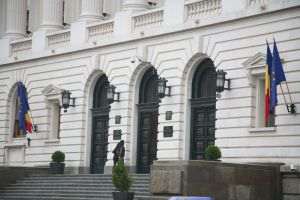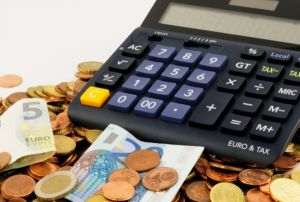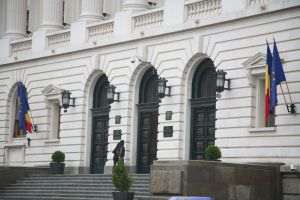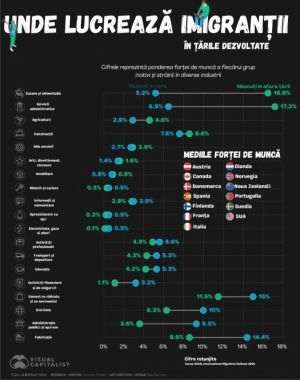The leu has seen a constant and steep drop against the major currencies this month. This phenomenon has sparked diverse opinions, with part of the public opinion pointing the finger at the National Bank of Romania (NBR).
The leu has been weakening compared to other currencies as last year, a scandal rose around ROBOR, after the government approved the taxation of bank assets depending on the level of the ROBOR index.
Thus, while 3-month ROBOR fell in January below 3% (and then returned to over 3% in the last two days), and the NBR kept the policy rate at 2.5%, the leu weakened against the euro, the dollar and the Swiss franc (CHF), going from one low to the next.
On Friday, the Central Bank announced a reference exchange rate of 4.7648 lei for the European currency (up 0.79 lei over Thursday), whereas the American dollar rose to 4.2034 lei (compared to 4.1883 lei in the previous session), and the Swiss Franc was priced at 4.2213 lei, gaining 2.67 bani over Thursday.
Analysts estimate that investors are confused and disappointed by the evolution of taxation in Romania and by the measures passed by the government overnight, many companies announcing over night that they were dropping certain investments that they were planning to make in the coming period, a fact that affects the evolution of the exchange rate.
At the end of last week, the PSD has asked the National Bank of Romania to do its duty and to protect the national currency, saying that the central bank has sufficient resources to do so.
The social-democrats have mentioned: "In 2016, NBR governor Mugur Isărescu was saying that "the NBR is defending the national currency, assures price stability (...) and the over 3-4 million Romanians who have loans with banks. Today, the NBR has reserves of over 36.8 billion Euros, meaning more than twice the cash circulating in Romania. It therefore has sufficient resources to defend the national currency. Together with the millions of Romanians who have installments to pay to the banks, we are asking the NBR to do its duty!"
In the opinion of the PSD, the exchange rate cannot and should not be set by a government decision, as the only institution that is entitled to manage the leu/euro exchange rate in a "controlled" manner is the NBR.
On Friday, the representatives of the Ministry of Public Finance (MFP) have sent, on Friday, that the National Bank of Romania is the institution that needs to establish and oversee the compliance with the currency regime and to draft the exchange rate policy, according to art. 2 parag (2) of the Law no. 312/2004 concerning the Bylaws of the NBR, and not the Romanian government.
The aforementioned press release further states: "Moreover, according to art. 9 of the same law, in order to apply the exchange rate policy, the NBR sets the exchange rates for its own operations on the currency market and draws up the balance of payments and other words concerning Romania's international investment position". According to the quoted source, the NBR governor Mugur Isărescu was saying, in 2011: "We are protecting the international currency, it is our product, just like a commercial bank protects a product, we protect our own product, this institution issues the leu and, until the adoption of the Euro, our product is to be defended. I don't think we are committing an act of barbarism by defending our product".
That is why, according to the Ministry of Public Finance, "for the macroeconomic stability of the NBR, it is vital for the NBR to abide by all its legal obligations".
The government wants a loyal cooperation with the National Bank of Romania, for the harmonization of the fiscal and monetary policies, to the benefit of the citizens and the business sector, the quoted document concludes.
In response, the National Bank of Romania has pointed out that it is constantly involved, "especially so in these days, in the drafting and the application of the monetary and exchange rate policy, in the context determined by the internal and international factors".
In this context, the NBR is seeking "a loyal cooperation with the Ministry of Public Finance, for the harmonization of the fiscal and monetary policies, to the benefit of citizens and the business sector".
Such a collaboration involves a prior consultation of the NBR when decisions are made which affect the monetary policy of the central bank and the country's financial stability, the representatives of the NBR conclude.
• CREDERE: "The banks' customers are bearing the rise of the loan hike"
The weakening of the leu compared to the Euro and CHF will affect consumers with loans denominated in CHF, particularly those who allocate a large portion of their income for the repayment of their monthly installments, bank borrowers say. Consumers of the CREDERE Association told us: "For low or median income families, even an increase of the installments by just a few tens of lei can put them in default, and the accrued penalties could make it difficult for them to pay their monthly installment on time.
While banks have not reacted when CHF borrowers have been affected by the doubling of the exchange rate, we don't know to what extent they will be willing to come up with solutions now. We are hoping that they have learned from their mistakes and that this time they will answer their requests from their customers who are having problems making their payments, especially since in certain cases the law requires that.
Unfortunately, its customers bear the exchange rate increase, and the representatives of the banks are already declaring nonchalantly that the blame lies either with the government, through the measures taken, or even to the customers, who did not take precautions before borrowing in foreign currencies. Either the leu is weakening, or the ROBOR is rising, or the country risk is rising, we often the hear the bankers' statements that it will be the borrowers that will bear all the consequences. Or, with that being the case, how do these statements prove that banks want a fair partnership in the contracts that the consumers will sign?"
A few days ago, Ionuţ Dumitru, the president of the Fiscal Council, was saying that in the financial markets there is a negative sentiment when it comes to Romania, due to the fiscal measures passed at the end of the year, which are affecting the exchange rate: "There are fundamental factors that have led to a weakening of the exchange rate, not necessarily the recent one. If we look, the exchange rate has been weakening gradually for two years now. The deterioration of the balance of payments, the increase in the current account deficit, are factors that put pressure on the exchange rate and if we look at last year, the current account deficit has increased somewhere to around 4.5% of the GDP, which isn't exactly low. And in this context, it is clear that the demand for foreign currency, led by the higher imports, is putting pressure on the currency exchange rate. At the same time, there is a recent negative sentiment on the financial markets, especially in the context of the fiscal measures passed at the end of last year".
One week ago, Adrian Vasilescu, strategy consultant at the NBR was saying: "It is obvious that the national currency has moved downwards quickly after January 1st, but not quickly enough that it would concern those who conduct a rigorous market analysis. Books say that when a currency, regardless of the market, depreciates by more than 4% or 5%, only then does it become a situation which needs to be reviewed with a view of an intervention by the Central Bank". According to him, the National Bank of Romania will not be able to and will never take any intervention against the natural course of the currency. This natural course is determined by causes which are not the result of the currency market, but rather from the extra-currency market. "When the local currency market excessively weakens or strengthens we look around, because we are in a region which these days, after January 1st, the forint has had a moment of weakening in mid February, and then it has stabilized its course and entered a normal path, the Czech Krona is doing well, and the Polish zloty is stabilized. (...) There are a few causes which are also the result of our own distinctive characteristics. It is not the Ordinance, first of all (ed. note: Ordinance 114/2018 for the application of some fiscal and budgetary measures) even though there are many people saying that is where the problem lies. It does play a role, but there is also the balance of payments, the trade balance which is then reflected in the balance of payments. The fact that Romania has imported goods worth 1 billion Euros last year every month has created a special situation every month has created a special situation on the forex market. So the forex market is looking first and foremost at what is happening to the trade balance. How much a country imports, how much it exports and how big the difference between exports and imports is. Only if exports are good, do imports go faster than exports. Then the RON-foreign currency exchange rate becomes the first mechanism for restoring balance in the economy. We are importing so much because we have a high consumer demand which cannot be covered by the domestic supply of goods and services. In order to cover that demands imports are used. Importers are adapted to bringing in goods from abroad".
In the beginning of this month, investors were announcing that 2019 is going to be one of challenges, as the positive evolution of the economy is in question, among others, by the fiscal changes, by the expected increase in price and construction of bank lending and the significant drop of the appetite for investment. According to a poll conducted by Frames, the emphasizing of the financial deadlock, the hike of taxation and the negative evolution of the exchange rate represent the main concerns of investors in the beginning of the year.
On January 8th, NBR governor Mugur Isărescu was saying that the "greed tax" (the tax on banking assets based on the ROBOR), which came into effect this year, was a bombshell dropped at the same time as Christimas. Also then, the Board of Directors of the NBR kept the policy rate stable.
Adrian Vasilescu, BNR: "The ROBOR would rise to 6% or 7% if the National Bank of Romania intervened on the currency market and sold some of its forex reserves, said Adrian Vasilescu, the NBR's strategy consultant, on TV. He said: "If it were to dump (amounts from the currency reserve ed. note.) let's see what would happen. So we bring in the foreign currency on the market, we remove the lei of the investors, because the investors who own lei now would like to be rid of it because that is what is happening on the international market as well, they want to get rid of it, to convert them to foreign currency. Of course, what is happening there is that they get sold and bought because for someone to buy someone else needs to sell. If they don't get bought, then one needs to keep them and wait for better days. But if they get sold now and there are buyers, then there is a lot of hubbub, and the leu weakens further. Well if the central bank of Romania were to take out too much foreign currency these days when the international market were to put pressure on the domestic market, what would happen? There would be excess currency, the lei from the investors in the market would be at a premium, the interest rate would rise, the ROBOR would rise above 5 or 6 or 7%.... The intervention on the currency market is like brain surgery. You can't perform brain surgery without thinking of the consequences".
Mr. Vasilescu said that the recent weakening of the leu is not caused by domestic factors, but by the fact that the international market has intervened, on which there are billions of lei in circulation. Adrian Vasilescu said that the exchange rate of the leu on the international currency market has not exceeded 4.79 lei for one Euro.





























































